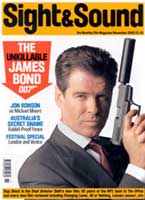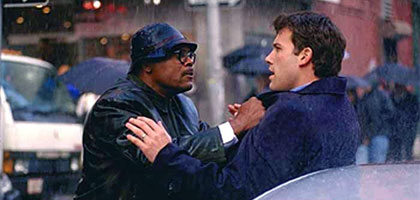
Street Legal
Film of the Month: Changing Lanes

Ryan Gilbey wonders if the politics of Changing Lanes are shift stick or unthinkingly automatic
Samuel L. Jackson has not yet provided compelling evidence that he can play much besides funky hipsters (Pulp Fiction, The Long Kiss Goodnight) or righteous avengers (A Time to Kill), but the conscientious thriller Changing Lanes hints there are fresh ambiguities to be mined in the latter category. Here Jackson plays Doyle Gipson, whose abstinence from alcohol does little to temper his temper after a collision on New York's FDR Drive with hotshot attorney Gavin Banek (Ben Affleck). Doyle tries to act honourably. It is he who refuses Gavin's offer of a blank cheque, and later he will also make an attempt to return to Gavin the important legal document - the film's macguffin - the attorney has inadvertently discarded. In both instances Doyle's good nature goes unappreciated. In the first Gavin speeds off to court, leaving Doyle - who also has a court appointment, to stop his ex-wife and young sons from moving state - stranded on the freeway. In the second Doyle's altruism comes too late to prevent Gavin's visit to Mr Finch, a computer hacker who renders Doyle bankrupt with the touch of a button.
The screenplay, by Michael Tolkin (The Player, Deep Cover) and debutant Chap Taylor, sometimes seems poised to commit the ultimate heresy of making a main character in a Hollywood movie unsympathetic: in one scene Doyle clubs two casually racist strangers with a telephone receiver. But the film is always careful to mitigate his aggression. The risk in removing from Doyle all responsibility for his actions is that the picture can appear to mollycoddle him - you can sense him being groomed for the role of martyr on the long, bad Good Friday on which the movie takes place. A kind of resurrection, on the other hand, awaits Doyle's tormentor, played by Affleck with a swaggering arrogance so vivid you can almost smell cologne and crisp hundred-dollar bills whenever he's on screen. Affleck has more room for manoeuvre than Jackson, partly because he isn't called on to solicit the audience's sympathy. The pleasure of watching Affleck forcibly relieved of his security and complacency will be relished by anyone who enjoyed seeing Cary Grant sullying his suit in North by Northwest, Jeff Daniels getting blood on his in Something Wild or Will Smith losing his altogether in Enemy of the State. It's one of modern cinema's favourite spectator sports: the ritual humiliation of the privileged male.
The memory of Joel Schumacher's Falling Down is also invoked, though here the audience gets two Michael Douglases for the price of one as Doyle and Gavin lapse into a game of tit-for-tat that affords both men numerous chances to blow a gasket. The thrill of these scenes - Doyle unscrewing a wheel on Gavin's car; Gavin convincing a school principal that Doyle is a budding kidnapper - is refreshingly primitive: it's just schoolyard hi-jinks, and only a few gears up from the petty vengeances of Richard Dreyfuss and Danny DeVito in Tin Men. It's a serious problem, though, that the writers haven't worked out how to put the brakes on this part of the film, or how to end the movie. It was charitable of Tolkin and Taylor to give the audience a burst of dumb pleasure in the middle of such a didactic, hotheaded picture. But perhaps they shouldn't be surprised that we experience a steep come-down in the final 30 minutes during which several unconvincing situations are smuggled past our eyes, among them Gavin's sudden redemption, brought on by witnessing the purifying tears of Doyle's children, and Doyle's ability to sneak past the security nightshift and appear in Gavin's office.
It's a measure of the picture's persuasive urgency that such discrepancies are not always immediately apparent. That's not just its visual urgency - though the film's vocabulary of whip-pans, out-of-focus zooms, handheld tracking shots and jarring cuts ensures that even the most hardened Dogme buff may have difficulty getting comfortable in that multiplex seat. (Only the stuttering, garage-inflected loops of David Arnold's score are overused in pursuit of suspense.) But it also becomes apparent that British director Roger Michell has a need to get the story told, and to get it told properly.
That kind of efficiency can be valuable for a viewer. Michell has some dubious passages to work with - such as the moment when Gavin is summoned to a restaurant by his demure wife, whose endorsements of institutionalised infidelity mark her out as the movie's real villain. No director could make sense of a scene like that, whose only function is to give the audience someone to boo (or rather, someone else: as Gavin's boss and father-in-law, Sydney Pollack contributes another study in middle-aged corruption to rank alongside his performances in Husbands and Wives and Eyes Wide Shut). But Michell polishes it off briskly, maintaining the same low hum of menace he brings to the intimidating bustle of the courthouse or to the deserted bar where Doyle tries not to drink the tantalising bourbon he's just ordered. It's almost funny that Michell came to this job after a heart attack had prevented him from directing Captain Corelli's Mandolin - it would be difficult to imagine a movie less redolent of rest and recuperation than Changing Lanes.
Film-makers are commonly heard to discuss the cities or architecture in their work as characters in their own right, and Michell would have good reason to do so - his vision of New York is characterised by a rancid energy rarely seen since that other great Big Apple movie by a British director, Alexander Mackendrick's Sweet Smell of Success (1957). (It's also a sight more convincing than the Habitat London of his last movie Notting Hill.) The most recent picture to succeed fully in this aim was Taylor Hackford's 1997 The Devil's Advocate, which put a weird new spin on streets that must be overfamiliar even to someone who's never set foot outside Surbiton. Changing Lanes - which argues more convincingly than The Devil's Advocate that lawyers are the new satanists - depicts a city of stinging contrasts: between the boastful art collection (Mark Rothko, Andreas Gursky) on the walls of the law firm and the creepy children's drawings tacked up in Mr Finch's office; between affluence and poverty; between, quite simply, Gavin and Doyle.
It's odd that no one involved with Changing Lanes appears to have noticed that the narrative actively upholds those divisions. At the end of the film power over black lives still resides in white hands, just as it did in Trading Places, a movie to which Changing Lanes is more closely related than it would care to admit. It's Gavin's assurances that persuade Doyle's ex-wife to thaw out. The film says to its white viewers: Don't be Old Nick when you can be St Nick - play Santa Claus to a black family in your neighbourhood today. The message is only reinforced by the music over the closing credits: Annie Lennox's sanitised reading of Bob Marley's 'Waiting in Vain'. It's a choice that says more about white treatment of black culture, and about the film's target audience, than the film-makers can possibly realise.
